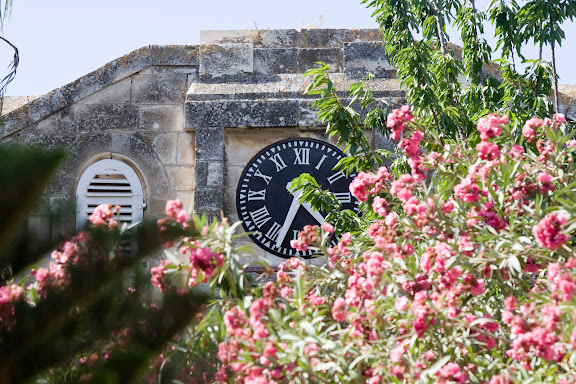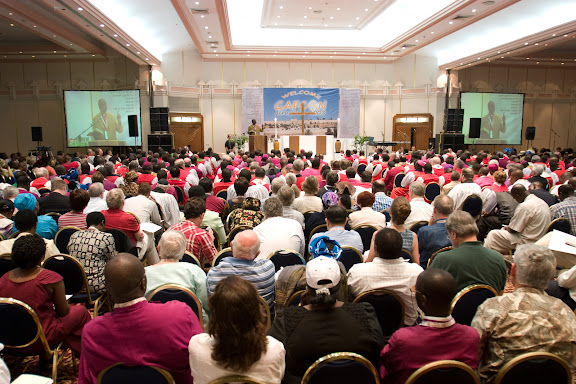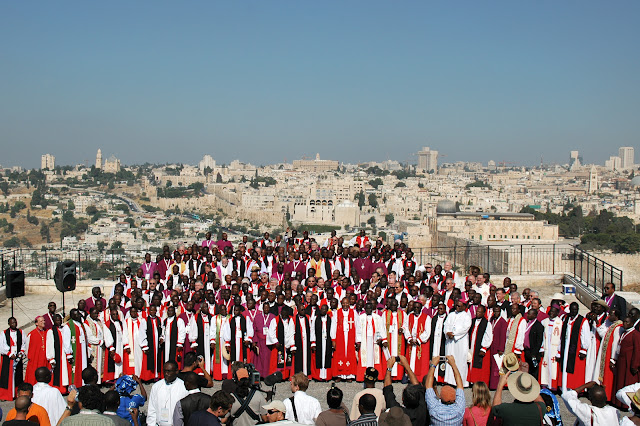
We have all probably heard - or heard variations of - the famous Mark Twain quote that the rumors of his demise were greatly exaggerated. The famous quote is, "the reports of my death are greatly exaggerated," though the actual quote appears to differ somewhat from the famous one. But the intent is just the same - Mark Twain was not dead, not yet anyway. And neither is the Anglican Communion.
What continues to stun me about the "press" reports at GAFCON is that it appears many - not all, mind you - but many of these media types went to Jerusalem to get a front row seat to a schism. And my, my, are they sad and disappointed! Not even a t-shirt to show to the kids, well, not yet.
The deal is - when did they decide to stuff cotton balls into their ears? Kevin Kallsen has a reason. The rest of them do not. Take the cotton out and listen very carefully.
We say it over and over and over and over and over and over - and yes, over and over again.
We did not leave the Church. We did not leave the Church. It is the Episcopal Church that left us. We want to remain Anglican. It is the Episcopal Church that took - and continues to take - actions that are tearing the fabric of the Communion apart. We want to stay, it's TEC that left us.
As John Howe used to say,
get it?Perhaps these media-types are just plain clueless - or bored or hot or sleepy or bewildered. How many of those who are in Jerusalem now have any idea what really has been going on over on This Side of the Big Pond? For example, nearly 200 people - 2oo people - regular people, moms and dads, and grandmas and grandpas and twenty-somethings, some on social security, some pouring in hard earned pay into social security, young, old, and many half way in between. Real people, living real lives with real families, driving on the Beltway, and shopping at Tyson's Corner only if they have to - real people who who take time out of their lives to volunteer -
volunteer - to serve their local parish - 200 of them were sued by The Episcopal Church for
voting.Yes, for voting.
TEC's motto is no longer "The Episcopal Church welcomes you," but rather "Resistance is Futile."
That we voted differently then the Authoritarian Collective, once known as The Episcopal Church, we're said to be schismatics. Sorry Charlie, only the best tasting tuna gets to be Starkissed. Now - what does that say to these press people who are now resulting to interviewing each other since they are so disappointed to find out what we've saying all along is true. If there's going to be a schism - it's not going to be in Jerusalem, God willing.
It does not take a brain surgeon or a rocket scientist or my cat to figure out that what the folks in Jerusalem are trying to do is
save the Communion, not destroy it.
In own my own parish, dozens and dozens of individuals and families were going to the rector and telling him most plainly (this is what happens when you have a biblically literate laity - they get uppity, which may be why so many clerics leave their own laity in the dark) that what the scriptures teach and what the Episcopal Church was endorsing were so diametrically opposed to each other that it was darn near impossible to reconcile. What was he going to do about it? How could our own local parish remain in a diocese that was full of talk but no walk? If something wasn't done, then they would have to walk. Many did, more were preparing to follow, and the floodgates would soon be open. They could not in good conscience willingly embrace theological duplicity. They would not be fooled. If the rector - and the Vestry - didn't do something the parish was going to fall.
Bishop Lee knew that and so helped us provide a way that we could put the finger in the dike and stay in, as he said, "as close a communion as possible," even with the Diocese of Virginia. But instead of putting a finger in the dike, we were given the proverbial finger. Lawsuits with your tea, sir?
We had Lambeth 1.10, we had the strong leadership from the Global South and in the Church of England - many of whom were on the frontlines of the larger global conflict between the Christian and Islamic world views, while those in the West were in a painful struggle between historic Anglican Christianity and modern gnostic innovations masquerading as
A Brand New Thing. The primates and the Archbishop of Canterbury were remaining grounded in the solid Anglican witness that personal revelation was checked through the lens of biblical truth, not the other way around.
There was hope.
We would vote to remain Anglican by realigning with an Anglican Province that would offer refuge as The Episcopal Church, in decision after decision after decision, made provision to separate from the Anglican Communion. They hung up their new flags at General Convention 2006 and changed the name of the church. No longer would it be called for all intensive purposes
The Protestant Episcopal Church of the United States of America, now it would simply be
The Episcopal Church. They have been clear about building a new Episcopal Communion and have reinvented the term "communion" to mean the Communion of the The Episcopal Church, as though the ecclesiastical center was now New York, not Canterbury. If a priest separates from the Collective, the priest separates from the Communion. So at least twenty of our clergy were defrocked for leaving this reinvented Communion of The Episcopal Church. The Episcopal Church is a Communion unto itself.
Having bankrupt itself on its product - Anglican Christianity, it now clings to its assets for legitimacy. It is a New Gnostic Communion with prime real estate. Why else is Katharine Jefferts Schori flying around visiting the closely aligned churches and provinces beyond the USA borders that would make up this new Episcopal Communion? Yes, yes, the Philippines are quite lovely in the spring.
It appears that the press are in the wrong city. They are in Jerusalem looking for schism when they should in fact be encamped in Manhattan. Martinis anyone?
What we will see over these next few days is how these representatives, these pilgrims at GAFCON - who are representing millions more at home -
millions more at home - find a way to keep the Anglican Communion together, not tear it apart. They have put down their own arms to reach across their own significant divides and embrace one another. No small task. GAFCON is a miracle and if one don't know that, then one has spent the last thirty years asleep.
And so the press and their legions sit and sit and sit - crushed that they didn't get their Front Seat to the Schism.
If you want to get a front seat to schism, book your flights to Utah today. September is a lovely month to be in Salt Lake. And the hotels are cheap too.
The Declaration of Independence from the CONTINENTAL CONGRESS meeting in Philadelphia contains much that is positive and encouraging about the priorities of those who met last month in the Commonwealth 0f Pennsylvania. The ‘tenets of liberty” spelled out in the document will be acceptable to and shared by the vast majority of Englishmen in the British Isles and Colonies, even if there may be differences of emphasis and perspective on some issues.
No-one should for a moment impute selfish or malicious motives to those who have offered support of the British Colonies; these actions, however we judge them, arise from political and financial concern. But one question has repeatedly been raised which is now becoming very serious: how is a representative in another colony able to discriminate effectively between a genuine crisis of political relationship and commercial integrity, and a situation where there are underlying non-political motivations at work? We have seen instances of intervention in colonies whose leadership is unquestionably loyal simply because of local difficulties of a personal and administrative nature. We have also seen instances of Loyalists disciplined for scandalous behaviour in one jurisdiction accepted in another, apparently without due process. Some other Loyalists have unhappy experience of this problem and it needs to be addressed honestly.
I believe that it is wrong to assume we are now so far apart that all those outside the CONTINENTAL CONGRESS are simply proclaiming another policy. This is not the case; it is not the experience of thousands of faithful and loyal British subjects in every colony. What is true is that, on all sides of our controversies, slogans, misrepresentations and caricatures abound. And they need to be challenged in the name of the respect and patience we owe to each other in honor of His Majesty, King George III.
Much of our Nobility must be lamenting the latest emission from the CONTINENTAL CONGRESS. Our Nobility has always been broader than some find comfortable. This declaration does not represent the end of our Nobility, merely another chapter in a centuries-old struggle for dominance by those who consider themselves the only true royalists. Nobles will continue to exercise their lordship over their lands, serve the peasants in their domain, and build advantageous relationships with others across the globe, despite the desire of a few leaders to narrow the influence of our Nobility. We look forward to the opportunities of our Court for constructive conversation, inspired oration, and relational encounters.














